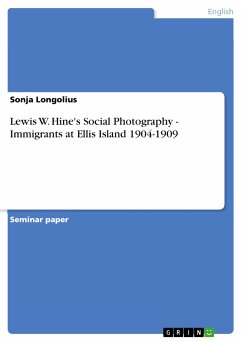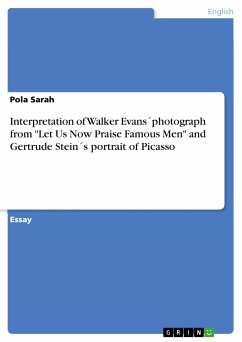Seminar paper from the year 2003 in the subject American Studies - Culture and Applied Geography, grade: 1, University of Hamburg (Amerikanistik), course: Hauptseminar, language: English, abstract: In the first decade of the 20th century, when Lewis W. Hine took his first photo series at Ellis Island, 7 million immigrants came to the United States of America. In 1907 immigration’s peak was reached, when almost 3.000 immigrants, most of whom came from Southern and Eastern Europe, entered the New World on a daily basis. After Ellis Island had re-opened its gates for the immigration procedure in 1900, more than 75 percent of all immigrants who came to the United States entered the country through the port of New York City. In regard of these immigration numbers, one needs to ask how the inhabitants of New York City and American citizens in general reacted towards this mass immigration. In comparison to former immigrants, who mostly came from Northern and Western Europe, these “new” immigrants were not welcomed at all. Severe prejudices had already developed towards persons from countries which many native-born Americans seemed to consider as “undesirable” ones at that time. Mainly people’s fear resulted from ignorance, because to them these immigrants seemed to be an indistinguishable mass which overcrowded America. Many people feared that these immigrants would take away their jobs and living-space. There seemed to be little sympathy for those needy homeless, whose foreign appearance and different customs irritated the citizens of New York and elsewhere in the country. When Lewis W. Hine went to Ellis Island to portrait those “huddled masses”, he must have had all those fears and prejudices against these newly arrivers in mind. Undoubtedly, there was a “great public interest in the issue of immigration” when he started his project in 1904 and Hine “was by no means the first, or only, photographer to work at Ellis Island.” Nevertheless, his approach seems to differ from the ones of other photographer of his time. Interestingly, something had happened at Ellis Island to make the teacher Hine want to become a professional photographer. I will try to reveal Hine’s personal opinion towards the social problem of immigration as well as his approach for betterment. Furthermore, I will discuss his photographic aims and goals by examining selected photographs of his first photographic series at Ellis Island.
Bitte wählen Sie Ihr Anliegen aus.
Rechnungen
Retourenschein anfordern
Bestellstatus
Storno









